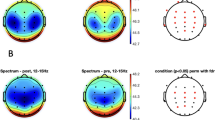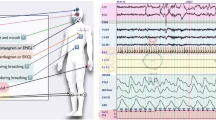Summary
1. Paradoxical sleep is a complex phenomenon which can be divided into three stages: 1) the stage of general activation, or desynchronization of slow activity in all areas of the brain, 2) the stage of predominance of the hippocampal δ-rhythm and 3) the stage of predominance of the hippocampal ϕ-rhythm.
These stages are considered to have their neurophysiological mechanisms subcortically. The stage of general activation would be determined by excitation of the reticular formation, the stage of hippocampal ϕ-rhythm by excitation of the hippocampal centers of motivation, and the stage of hippocampal δ-rhythm by excitation of the hypothalamic centers causing inhibition of drives.
Similar content being viewed by others
References
NANEISHVILI, T. L. and T. N. ONIANI. Reports of the Georgian Academy of Sciences. 55:173, 1969.
ONIANI, T. N., P. MOLNAR and T. L. NANEISHVILI. Reports of the Georgian Academy of Sciences. 55, 1969.
TSKIPURIDZE, L. R. Tr. Inst. Fiziol. Akad. Nauk Gruz. SSR. 8:209, 1950.
ANAND, B. K. Physiol. Rev. 41:677 1961.
ASERINSKY, E. and N. KLEITMAN. J. Appl. Physiol. 8:1, 1965.
BREMER, F. C. R. Seances Soc. Biol. Filiales. 122,464, 1936.
DEMENT, W. C. Electroencephalogr. Clin. Neurophysiol. 10, 291, 1958.
DEMENT, W. C. and N. KLEITMAN. Electroencephalogr. Clin. Neurophysiol. 9:673, 1957.
ELAZAR, Z. and W. R. ADEY. Electroencephalogr. Clin. Neurophysiol. 23:225, 1967.
GOGOLÁK, G., C. STUMPF, H. PETSCHE and J. STERC. Brain Res. 7:201, 1968.
GRASTYÁN, E. In: The Central Nervous System and Behavior. New York, 119, 1959.
GRASTYÁN, E. and G. KARMOS. Acta Physiol. Acad. Sci. Hung. 20:41, 1961.
GRASTYÁN, E., G. KARMOS, L. VERECZKEY and L. KELLÉNYI. Electroencephalogr. Clin. Neurophysiol. 21:34, 1966.
GRASTYÁN, E., I. SZABÓ, P. MOLNÁR and P. KOLTA. Comm. Behav. Biol. A 2:235, 1968.
GREEN, J. D. and A. ARDUINI. J. Neurophysiol. 17:532, 1954.
HESS, W. R. Helv. Physiol. Pharmacol. Acta. 2:305, 1944.
HESS W. R. The Functional Organization of the Diencephalon. New York, 1957, p 180.
JOUVET, M. Physiol. Rev. 47:117. 1967.
JOUVET, M., F. MICHEL and J. COURJON. C. R. Seances Soc. Biol. filiales. 153:101, 1959.
MOLNÁR, P. and E. GRASTYÁN. Acta Physiol. Acad. Sci. Hung. 30:304, 1966.
PARMEGGIANI, P. L. In: Structure and Function of the Limbic System. Amsterdam, 1967, p. 413.
Author information
Authors and Affiliations
Rights and permissions
About this article
Cite this article
Oniani, T.N., Molnar, P. & Naneishvili, T.L. The nature of the paradoxical phase of sleep. Neurosci Behav Physiol 4, 1–7 (1970). https://doi.org/10.1007/BF01125579
Issue Date:
DOI: https://doi.org/10.1007/BF01125579




